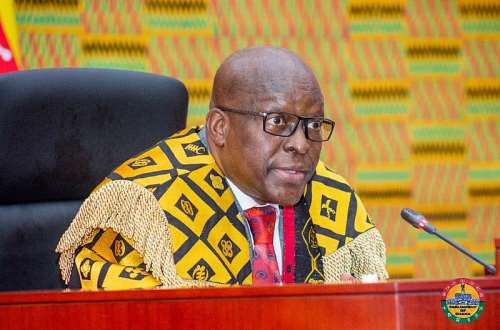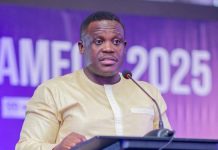Majority Leader in Parliament, Alexander Afenyo-Markin, has sharply criticized Speaker Alban Bagbin, accusing him of failing to uphold Ghana’s democracy.

His comments follow the Supreme Court’s announcement that it would deliver a judgment on the ongoing controversy over vacant parliamentary seats on Tuesday, November 12.
Speaking to the press after the adjournment, Afenyo-Markin expressed his frustration with Speaker Bagbin’s handling of the situation in Parliament, particularly the issue of Minority MPs occupying seats traditionally reserved for the Majority caucus.
According to Afenyo-Markin, Bagbin has failed to address this violation, allowing Members of Parliament (MPs) from the National Democratic Congress (NDC) to sit on the Majority side of the House.
“The clerk of parliament had properly arranged our seats on the right side of Mr. Speaker, with our name tags in place. The NDC came in and moved them. Mr. Speaker saw this happen and continued the proceedings without intervening. This is where I believe Mr. Speaker has failed the nation and failed our democracy,” Afenyo-Markin stated.
He further criticized Bagbin for turning a blind eye to what he described as a clear disruption of parliamentary norms.
“As the head of the assembly, you enter the chamber and see one group of MPs sitting in another group’s designated seats, and you choose to ignore it.
Instead of addressing the issue, you spin it to say that the majority members who called for the recall were absent. Absent where?”
Afenyo-Markin’s remarks come at a time of heightened political tension within Parliament, fueled by the controversy over Speaker Bagbin’s decision to declare four parliamentary seats vacant.
The Majority Leader’s criticism underscores the growing frustration with the Speaker’s handling of parliamentary procedures, which many believe is eroding the authority of the Majority caucus.
As the country awaits the Supreme Court’s ruling on the legality of the Speaker’s actions, all eyes are on the legal and political developments, which are set to shape the future of Ghana’s parliamentary processes and democratic governance.
























































![[FREE FREE MONEY] Predict and Win a Guaranteed GH¢200 From Us EVERY WEEK](https://wordpress.ghanatalksradio.com/wp-content/uploads/2022/02/Predict-and-Win-Final-09-03-2021-218x150.jpg)
![[Predict & Win – 8th/Oct.] WIN A Guaranteed ¢200 From Us This Week](https://wordpress.ghanatalksradio.com/wp-content/uploads/2021/10/maxresdefault-16-218x150.jpg)
![[Predict & Win – 2nd] WIN A Guaranteed ¢200 From Us This Week](https://wordpress.ghanatalksradio.com/wp-content/uploads/2021/09/maxresdefault-50-218x150.jpg)
![[Predict & Win – 25th] WIN A Guaranteed ¢200 From Us This Week](https://wordpress.ghanatalksradio.com/wp-content/uploads/2021/09/maxresdefault-36-218x150.jpg)
![[Predict & Win – 18th] WIN A Guaranteed ¢200 From Us This Week](https://wordpress.ghanatalksradio.com/wp-content/uploads/2021/09/maxresdefault-23-218x150.jpg)








![[National cathedral] See full list of churches that have contributed since 2018](https://wordpress.ghanatalksradio.com/wp-content/uploads/2020/09/Ghana-National-Cathedral-GhanaTalksRadio-100x70.jpg)



